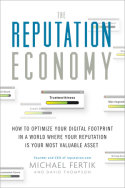 In The Reputation Economy: How to Optimize Your Digital Footprint in a World Where Your Reputation Is Your Most Valuable Asset, authors Michael Fertik and David C. Thompson examine the brave new world just on the horizon: the world of digital reputation. Sites like Yelp and Angie’s List already subject businesses to the mercies of customer reviews, but – aside from the occasional political aide getting fired for an ignorant tweet – individuals have been largely excepted from this new order. According to The Reputation Economy, however, these halcyon days are coming quickly to a close.
In The Reputation Economy: How to Optimize Your Digital Footprint in a World Where Your Reputation Is Your Most Valuable Asset, authors Michael Fertik and David C. Thompson examine the brave new world just on the horizon: the world of digital reputation. Sites like Yelp and Angie’s List already subject businesses to the mercies of customer reviews, but – aside from the occasional political aide getting fired for an ignorant tweet – individuals have been largely excepted from this new order. According to The Reputation Economy, however, these halcyon days are coming quickly to a close.
Freelancers already know the value of an online reputation. Having a positive and pervasive web presence – and corresponding Klout score – can mean the difference between entrepreneurial success and failure. Yet Fertik and Thompson are quick to note that everyone, not just the self-employed, will soon be on the receiving end of reputational karma. Because of the ubiquity of the reputation economy as described here, everyone who reads this book will benefit personally.
Imagine that when you walk into a car dealership the sales staff instantly know your approximate wealth based on the value of your house and when you bought it (via facial recognition or public property records). Or imagine that when you walk into a bar three people of the opposite sex instantly turn away from you after your dating score plunges thanks to a scathing online review from a previous significant other. You get the idea – your reputation will be used publicly, instantly, whether you like it or not.
Unfortunately, The Reputation Economy is not formatted or styled for approachability. While the chapters and subheadings progress logically, sentences often run long and without punctuation. There are no charts to break up the monotony of dry text, despite the authors’ frequent projections and citations.
Fertik and Thompson’s projections often feel recycled, chapter after chapter. Even if they aren’t identical, the examples given in the last half of The Reputation Economy will be glaringly obvious to anyone who paid attention to the first five chapters. This trend is easily the most off-putting thing about Fertik and Thompson’s book, but it isn’t the only problem with the text.
The Reputation Economy is bloated with needless information. At least 40% of the text feels like unnecessary exposition on everything from business school curriculum to the inner-workings of cloud storage. Perhaps Fertik and Thompson felt the need to break down their information so that even the most logically-challenged reader could benefit from it: an honorable goal, and one I wouldn’t put past the founder of Reputation.com. But good intentions do not change the fact that The Reputation Economy‘s 120 or so pages of useful material drag around 80 pages of deadweight.
Ultimately, The Reputation Economy is a useful, informative book, and – despite my earlier criticisms – it is one I would recommend. Its advice is universal, at least in the first world, and I would be remiss if I downplayed Fertik and Thompson’s strategies for salvaging a negative web presence; they’re simple, applicable, and practical. However, the authors’ over-explanations bog The Reputation Economy down, and this cannot be ignored. The bloated half of the book inevitably limits Fertik and Thompson’s readership to only those narrow few who are interested, as opposed to their intended audience: those who will profit.
3 out of 5 stars
I received this book from Blogging for Books for this review.
Image credit: World Economic Forum/Wikimedia Commons
